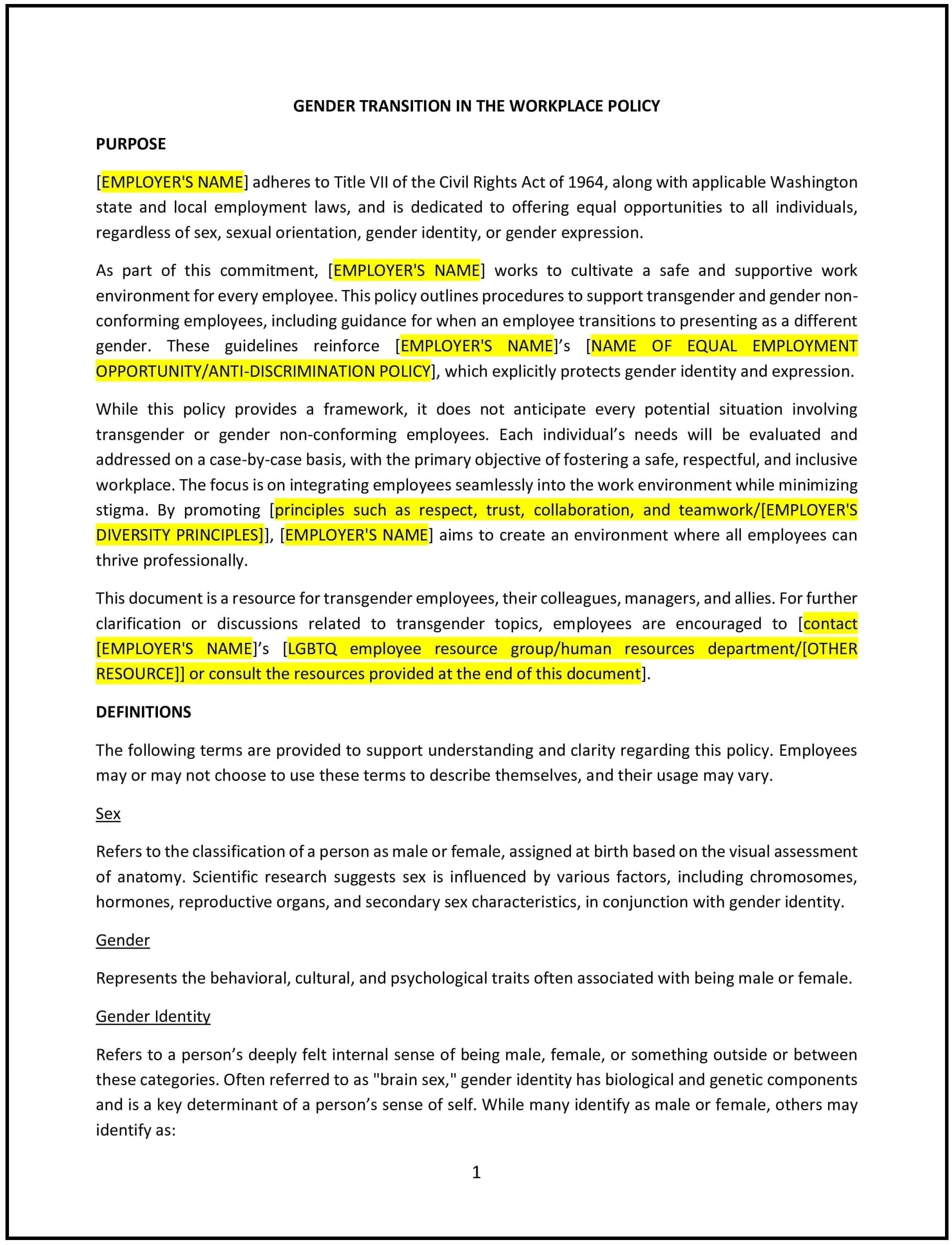Gender transition in the workplace policy (Washington): Free template
Got contracts to review? While you're here for policies, let Cobrief make contract review effortless—start your free review now.

Customize this template for free
This gender transition in the workplace policy is designed to help Washington businesses create a supportive and inclusive environment for employees undergoing a gender transition. The policy outlines the company’s commitment to treating all employees with dignity and respect, addressing the specific needs and challenges faced by employees transitioning in the workplace. It provides guidance on how to handle changes related to name, pronouns, medical leave, dress code, and confidentiality, while promoting a culture of acceptance and respect.
By adopting this policy, businesses can foster an inclusive workplace, demonstrate their commitment to diversity, and comply with Washington state and federal anti-discrimination laws.
How to use this gender transition in the workplace policy (Washington)
- Define support for transitioning employees: The policy should clearly outline the company’s commitment to supporting employees undergoing a gender transition. This includes offering accommodations for medical needs, respecting changes in name and pronouns, and addressing any other needs the employee may have during the transition process.
- Establish a respectful and confidential process: Provide employees with a clear and confidential process for informing the company about their gender transition. The policy should allow employees to decide when and how they wish to disclose their transition and to whom, ensuring confidentiality during this process.
- Address name and pronoun changes: The policy should explain how employees' name and pronoun changes will be handled in company records, email addresses, and other internal systems. It should clarify that employees’ gender identity and pronouns will be respected in all workplace interactions.
- Provide accommodations for medical needs: The policy should outline how the company will accommodate medical needs related to the gender transition, including time off for medical appointments, surgeries, or counseling. It should also address how the company will handle paid or unpaid leave.
- Ensure inclusive dress code policies: If the company has a dress code, the policy should clarify that employees undergoing a gender transition will be allowed to adhere to the dress code according to their gender identity. The policy should emphasize that the dress code should not discriminate against employees based on their gender identity.
- Promote respectful behavior: The policy should set clear expectations for employees regarding respectful behavior towards coworkers undergoing a gender transition. This includes the use of correct pronouns, avoiding discriminatory language or actions, and creating a culture of acceptance and inclusion.
- Set up a point of contact: The policy should designate a point of contact, such as an HR representative or diversity officer, who is trained to handle any issues or concerns related to gender transition in the workplace. This person can serve as a resource for both employees transitioning and those seeking guidance on how to support their colleagues.
- Promote compliance with Washington and federal laws: The policy should comply with Washington state laws, such as the Washington Law Against Discrimination (WLAD), and federal laws, including Title VII of the Civil Rights Act, which prohibits discrimination based on gender identity and expression.
- Review and update regularly: Periodically review and update the policy to ensure it remains compliant with any changes to Washington state laws, federal regulations, and best practices for supporting gender-diverse employees. Regular updates will help ensure the policy stays relevant and effective.
Benefits of using this gender transition in the workplace policy (Washington)
This policy offers several benefits for Washington businesses:
- Fosters an inclusive and respectful workplace: By implementing a clear and supportive policy, businesses can create an environment where all employees feel valued and respected, regardless of their gender identity.
- Improves employee morale and retention: Offering a supportive environment for gender-diverse employees helps improve job satisfaction and reduces turnover, as employees are more likely to stay with an employer that respects their identity.
- Enhances company reputation: Companies that are known for being inclusive and supportive of gender diversity are viewed positively by current and potential employees, as well as the public. This enhances the company’s reputation as an employer of choice.
- Reduces discrimination and harassment: A clear gender transition policy helps prevent discrimination and harassment by setting expectations for respectful behavior and providing employees with the tools and knowledge they need to support their transitioning coworkers.
- Supports legal compliance: The policy helps businesses comply with Washington state and federal anti-discrimination laws, reducing the risk of legal issues related to gender identity and expression.
- Promotes diversity and inclusion: By supporting employees undergoing a gender transition, the company fosters a culture of diversity and inclusion, which can lead to improved employee collaboration, innovation, and overall performance.
Tips for using this gender transition in the workplace policy (Washington)
- Communicate the policy clearly: Ensure that all employees understand the gender transition policy and the company’s commitment to supporting gender-diverse employees. Include the policy in the employee handbook and review it during onboarding. Provide regular reminders to reinforce its importance.
- Provide training for managers and HR: Offer training to managers and HR staff on how to support employees undergoing a gender transition, including how to handle name and pronoun changes, medical accommodations, and creating an inclusive work environment.
- Create an open and supportive environment: Foster a workplace culture where employees feel comfortable discussing gender identity and transition with their managers or HR. Encourage open communication and provide employees with the support they need to navigate the transition process.
- Address concerns promptly: If issues arise regarding gender transition in the workplace, address them promptly and confidentially. Ensure that employees feel supported and that any concerns are dealt with in a respectful and fair manner.
- Review and update regularly: Periodically review the policy to ensure it remains compliant with Washington state laws, federal regulations, and any changes in the company’s operations or employee demographics. Regular updates will help keep the policy relevant and effective.